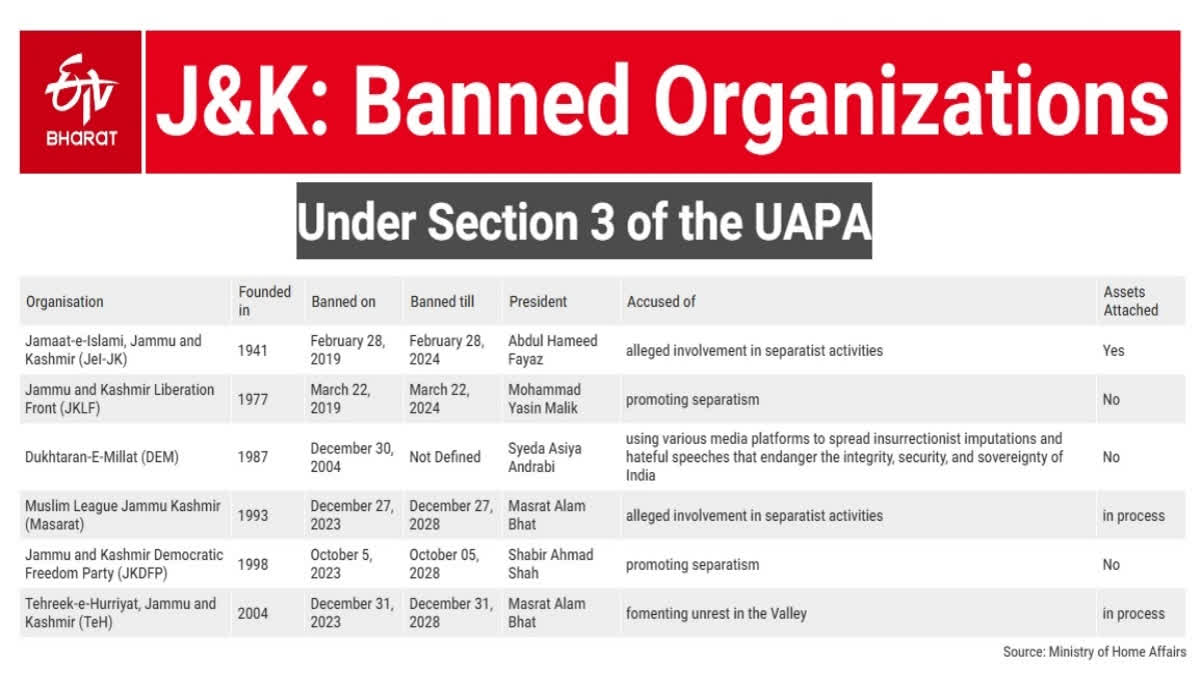Srinagar: Since the abrogation of Article 370 and 35A, the Jammu and Kashmir police, following directives from the Central government, launched a comprehensive operation named "All Out" to dismantle the militant and separatist infrastructure in the Valley. As part of this operation, the Jammu and Kashmir police, in collaboration with other security agencies, seized more than 125 immovable properties at 83 locations, including both land and buildings. According to Sections 8 and 25 of the Unlawful Activities (Prevention) Act, these properties are associated with the banned organisation Jamaat-e-Islami (JeI). An investigation conducted by the State Investigation Agency (SIA) has revealed that these properties either represent the proceeds of militancy or have been utilised to support activities related to militancy in the Valley.
SIA officials disclosed that 188 JeI properties across Jammu and Kashmir worth crores have been identified. These properties are either under legal scrutiny or in the process of being notified for further action. "This strategic move aims to disrupt the financial backbone of militancy in the region."
Meanwhile, in another such decision, the Central government on January 11, 2024, directed the Jammu and Kashmir administration to seize all assets, freeze bank accounts and block finances belonging to the recently banned separatist organisation Tehreek-e-Hurriyat and the Muslim League Jammu Kashmir, led by separatist Masarat Alam Bhat.
A senior police officer, while refusing to provide detailed information on the development, said, "The assets of both organisations are currently under assessment, and actions will be taken by the directives from the Centre."Both organisations were banned by the government, with Tehreek-e-Hurriyat, founded by the late separatist leader Syed Ali Geelani, being outlawed for five years. The Union Home Ministry, through two identical notifications, declared the Muslim League Jammu Kashmir (Masarat Alam faction) an unlawful outfit on December 27, 2023, and Tehreek-e-Hurriyat, Jammu and Kashmir (TeH), was banned on December 31, 2023, under the Unlawful Activities (Prevention) Act, 1967.
Invoking Section 42 of the UAPA, the Central government directed that all powers exercisable under Section 7 (prohibition of the use of funds) and Section 8 (notification of places used for an unlawful association) of the Act should also be exercised by state governments and Union Territory administration about these banned associations.
In the meantime, the Ministry of Home Affairs (MHA) has so far banned five separatist organisations pursuant to Section 3 of the UAPA and designated 13, including Dukhtaran-E-Millat (DeM), organisations as "Terrorist outfits" under Section 35 of the UAPA.
Banned separatist organisations (under Section 3 of the UAPA)
Jamaat-e-Islami (JeI), Jammu and Kashmir: Founded in 1941, JeI is a socio-political and religious organisation rooted in advocating Islamic principles. However, the group has faced scrutiny for its alleged involvement in separatist activities, contributing to the complex dynamics of the region. The organisation was banned for five years by the Ministry of Home Affairs (MHA) on February 28, 2019.
Jammu and Kashmir Liberation Front (Mohd Yasin Malik faction): Formed in 1977, the Jammu and Kashmir Liberation Front (JKLF) led by Mohammed Yasin Malik is particularly associated with pro-independence activities. The organisation was banned for five years by the MHA on March 22, 2019.
Jammu and Kashmir Democratic Freedom Party (JKDFP): Founded in 1998, the JKDFP advocates self-determination for the people of Jammu and Kashmir. However, the party has not been immune to accusations of promoting separatism. The organisation was banned for five years by the MHA on October 5, 2023.
Muslim League Jammu Kashmir (Masarat Alam faction): A faction of the Muslim League, MLJK-MA, formed by Masarat Alam Bhat in 1993, has come under scrutiny for alleged involvement in separatist activities. The organisation was banned for five years by the MHA on December 27, 2023.
Tehreek-e-Hurriyat, Jammu and Kashmir (TeH): Founded in 2004, Tehreek-e-Hurriyat (TeH) stands as a separatist conglomerate advocating the right to self-determination. However, the group has faced accusations of fomenting unrest, underscoring the challenges of balancing political ideologies in the region. The organisation was banned for five years by the MHA on December 31, 2023.
Dukhtaran-E-Millat (DEM), a women's separatist organisation formed in 1987, was banned and declared a 'terrorist organisation' under Section 35 of UAPA on December 30, 2004. The DEM advocates for the establishment of Islamic rule in Jammu and Kashmir. Apart from DeM, Lashkar-e-Taiba, Jaish-e-Mohammed, Harkat-ul-Mujahideen, Hizb-Ul-Mujahideen, Al-Umar-Mujahideen, Al Badr and five other militant groups operating in Kashmir have been banned after being declared as 'terrorist organisations' by the MHA.
Read more: J&K: 'Istisqa' prayers held at Srinagar Jamia Masjid for end to prolonged dry spell in Kashmir



